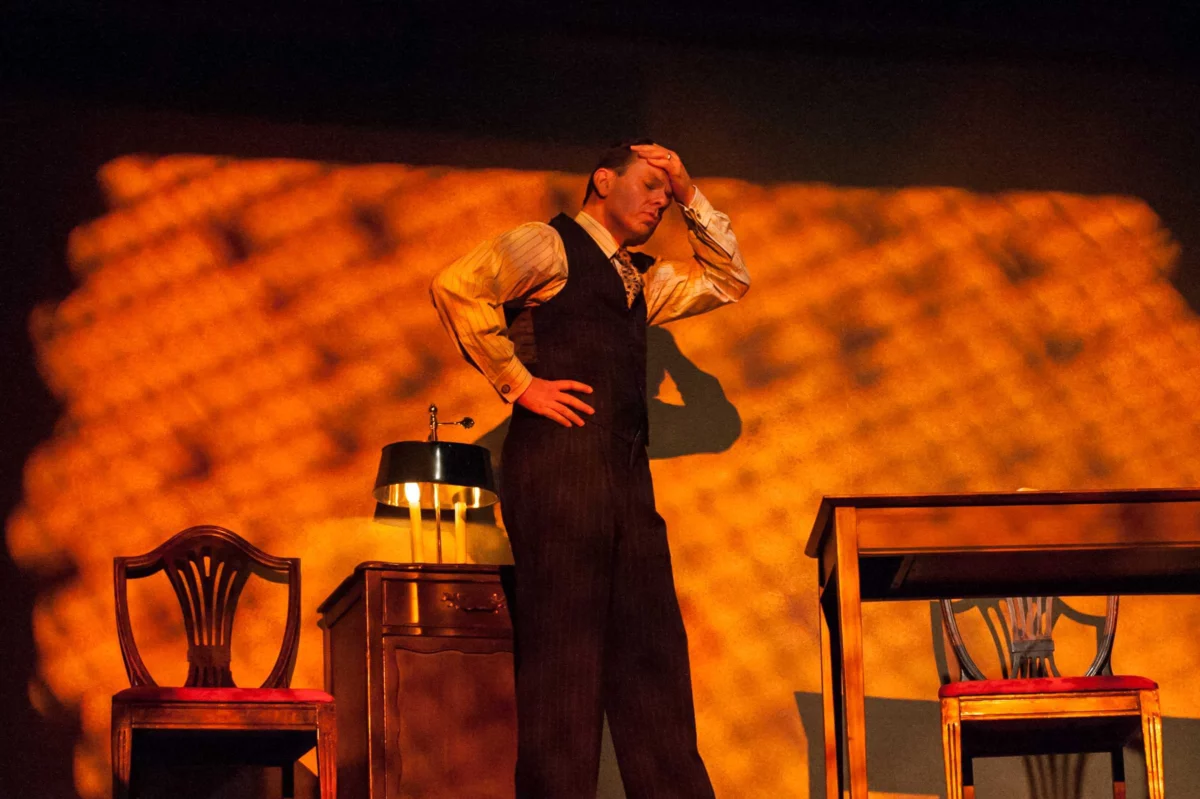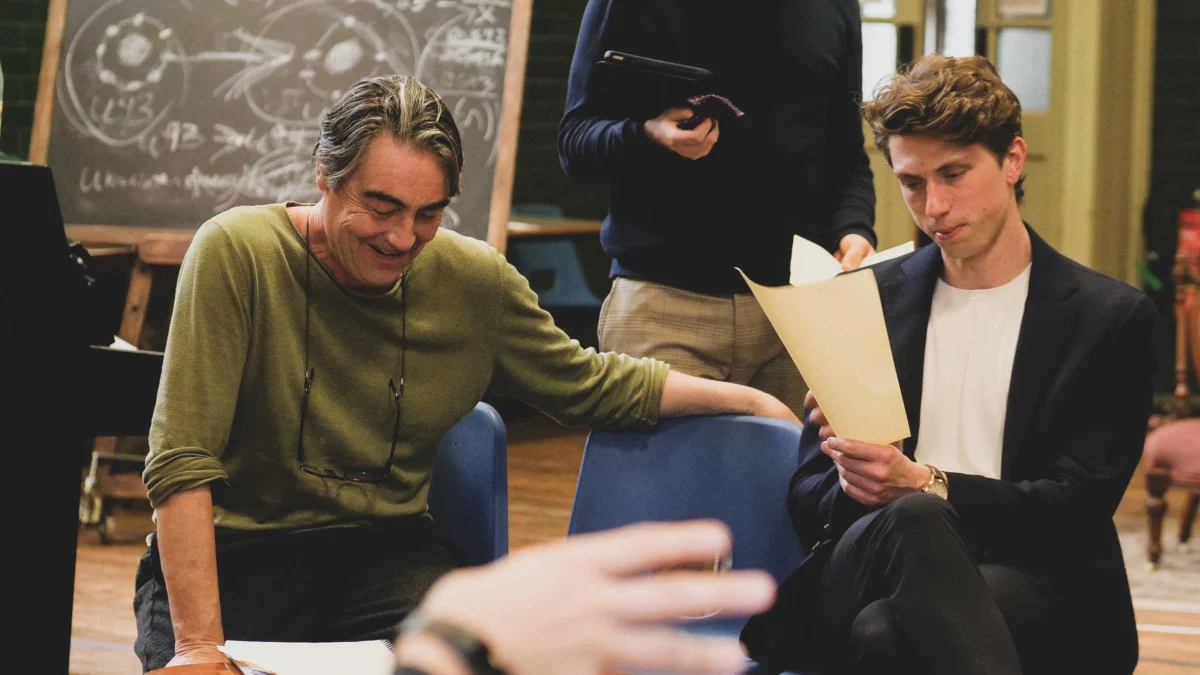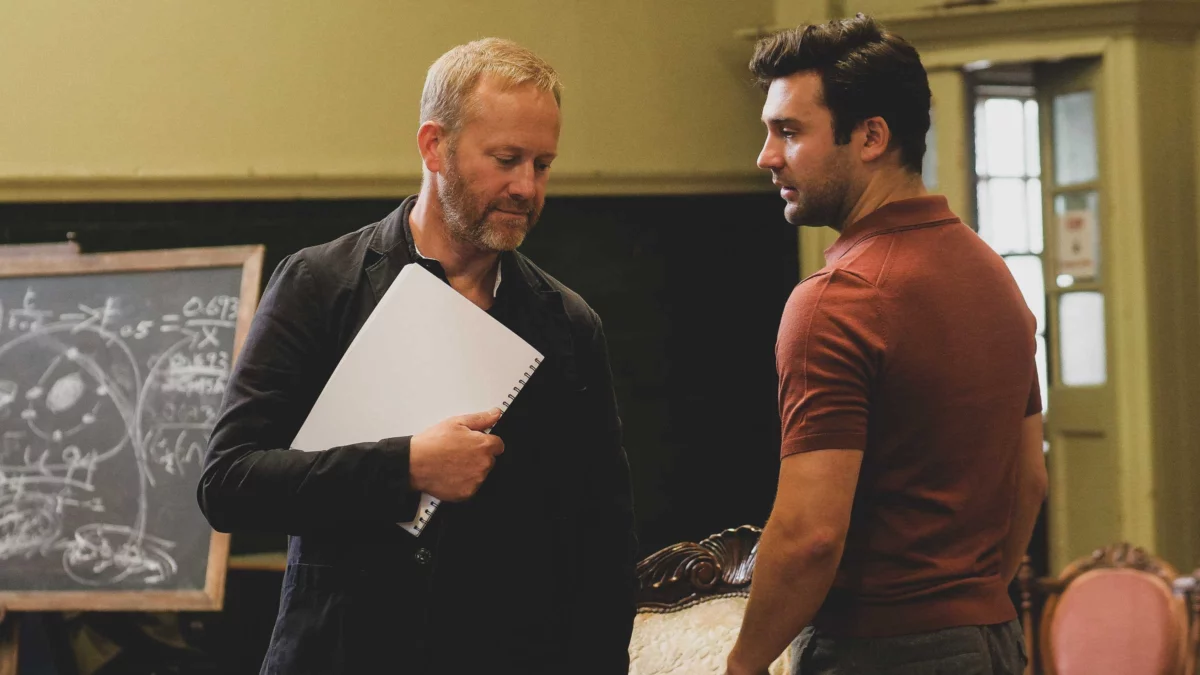In 1945, towards the end of World War II, Germany’s ten most accomplished scientists were taken captive by the allies and confined to Farm Hall, a villa in the English countryside outside of Cambridge, UK. The group included three Nobel Prize winners: Werner Heisenberg, Otto Hahn, and Max von Laue. For six months, their conversations were secretly recorded, transcribed, and sent to the United States. Allied leaders wanted to know how close these Germans had come to developing an atomic bomb. They also wanted to keep these scientists out of Soviet hands.
These conversations, and the moral questions they raise, are the subject of Operation Epsilon, a play that opens a five-week run at London’s Southwark Playhouse Elephant on September 15. “I wanted to explore whether there is a moral dimension to pure research in science,” says Operation Epsilon author Alan Brody, Professor of Theater Emeritus at MIT, and former Associate Provost for the Arts. “I wanted to discuss whether ethical questions should help determine what scientists choose to explore. And what better way to do that than to look at the brilliant German scientists who worked for Hitler.”

Birthed at MIT
Operation Epsilon was first produced in 2013 at the Central Square Theater Company in Cambridge, Massachusetts. The play won numerous awards, including Best New Play and Best Director from the Independent Reviewers of New England (IRNE).
Fittingly, this play built on a series of compelling conversations was itself conceived ten years earlier through a series of equally riveting conversations. “I’d been at MIT for about fifteen years,” says Brody, who came to MIT in 1988 to build its theater program. “And I’d become friends with many science faculty members, including many physicists. Together with one of these friends, Alan Lightman, we decided to form a discussion group between physicists and playwrights. We called the group the salon.”
Over the next twelve years, the salon met once a month for wine and cheese. Brody, Lightman, Weisskopf Professor of Physics Alan Guth, and Jerome Friedman—Professor of Physics Emeritus and a 1990 Nobel Laureate—were among its members. “The brilliant thing about the group was that there was no predetermined agenda,” says Lightman, a theoretical physicist and novelist who was the first person to receive a dual appointment in science and the humanities at MIT. “We would meet, scientists and artists, and just talk about things we found interesting. To look at ideas and issues from different perspectives and see what we might learn from each other.”
It took a few sessions for the salon project to acquire critical mass. At first, the two factions seemed to be speaking two different dialects. “But then, one evening, Alan Guth started talking about how he’d come to understand the concept of the expanding universe,” Brody recalls. “We were spellbound. The entire room was breathing in unison. That’s when I saw that the project was going to work.”
The salon group produced a spinoff group–the Catalyst Collaborative@MIT. This group aimed to stage readings and performances of plays based on science. Soon after, Lightman presented a recently published book: Hitler’s Uranium Club, by Jeremy Bernstein. “The book had the transcripts from the German scientists who had been confined at Farm Hall at the end of the war,” Lightman says. “It asked questions, implicitly, about whether it is right or wrong to pursue research that could lead to a device of mass destruction. I thought it might make a good subject for a play.”

From Script to Central Square Stage
Brody too thought the idea had legs and soon started working on a script. Some of the early scenes drew heavily on the transcripts published in Bernstein’s book. But as he grew more familiar with the story and the characters, the playwright started writing scenes from his own imagination. “I had to make the language more playable—more accessible to a theater audience,” he explains. “And I had to transform the speakers from historical figures into dramatic characters.”
Brody completed the script in 2008 and scheduled an early reading in MIT’s Little Kresge Theater. Among the audience was Ellen Berman, a member of the Council for the Arts at MIT (CAMIT) who’d developed a close friendship with Brody. “I was stunned and amazed,” says Berman, a former public policy director and experienced theatrical producer. “I consider myself a well-informed person. But I knew nothing of this piece of history. And Alan’s script raised important and provocative issues. At the end of the reading, I told him I was going to produce it. Alan asked me if I was crazy. He said it’s just ten men in a room. Who will want to watch it? I said we would make them watch.”
Berman contacted director Andy Sandberg, a Yale graduate, and the youngest producer ever to win a Tony Award as a producer on Broadway. Sandberg too was taken with Brody’s script, and agreed to direct developmental readings in New York and Sarasota, Florida. On March 7, 2013, in a collaboration between the Catalyst Collaborative@MIT and the Central Square Theater in Cambridge Massachusetts, Operation Epsilon, directed by Sandberg, made its premiere. The show ran through April 28.

Dreaming of London
Brody, Sandberg, and Berman had always hoped to stage Operation Epsilon again, particularly in London. “That was our dream,” says Berman. “The story takes place in England. It just made sense to do it there. After Central Square, we had several readings of the play. We were moving forward. Then COVID hit.”
Last November, London’s Southwark Playhouse announced it would open its long awaited second venue in January. The venue, a 310-seat facility named Southwark Elephant, would feature plays on five-week runs. Berman and Sandberg booked the theater and immediately called Brody to say the show was on. Sandberg conducted interviews and auditions for the new cast, which features veteran British actor and Olivier Award winner Nathanial Parker—best known as the lead in the BBC crime drama series The Inspector Lynley Mysteries—in the role of German scientist Otto Hahn.
“Andy put together a splendid cast,” says Brody, who attended several early readings. “Listening to this new cast made me see this story in a new light. It taught me things about my own play.”
For Brody, the new production of Operation Epsilon isn’t just a revival. The play, he says, is even more relevant today than when he wrote it. “Operation Epsilon is set at the end of World War II, at the dawn of the nuclear age,” he says. “But the questions it asks have to do with science, with morality, and how we should deal with discoveries with the potential to destroy our lives. We still have a nuclear threat. But today there are so many others, with the climate crisis, with AI. I think it’s important that we continue this discussion.”
Operation Epsilon runs from September 15 through October 21 at Southwark Playhouse Elephant, London. For tickets and more information: www.OperationEpsilon.com.
Written by Ken Shulman
Editorial direction by Leah Talatinian
